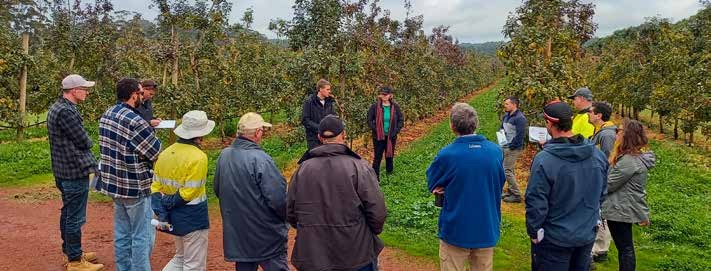PIPS
Researcher ROADSHOW
PIPS3 has just finished a whirlwind national tour – catch up on the insights from this research project.
Words Susie Murphy-White, project manager

Orchard discussion at the WA PIPS3 researcher roadshow at the Fontanini Orchard in Manjimup.
THE Productivity Irrigation Pests and Soils (PIPS3) Program has completed a national roadshow across apple- and pear-growing. It was rolled out to extend national and local outcomes of research, development and demonstration activities undertaken over the past three years. It began in late March at Agriculture Victoria’s Tatura SmartFarm Horticulture Field Day (with the theme ‘Future-proofing Horticulture in a Changing Climate’) and finished at the Fruit Growers Tasmania Conference (with the theme ‘Sustainable Profitability’) in Launceston, with regional events held at Nashdale (NSW), Lenswood (SA), Manjimup (WA) and Rookwood (Tas).
PIPS3 program coordinator Marguerite White says the interest shown by growers and advisors across the country demonstrate they are keen to hear directly from the researchers and consultants delivering the projects.
“The events were a great opportunity for open and practical discussion. The less formal regional events were PowerPoint free, allowing everyone to get into the orchard for some great chats,” says Marguerite. “The researchers introduced the key learnings and messages from investigation and trials over the past three years. Locals swiftly applied these to their own orchard systems and growing conditions, such as climate, soil type, water availability, pests and weeds, and fruit varieties and rootstocks.”
Soil Health and Nutrition
Dr Nigel Swarts (TIA) and regional facilitators of the PIPS3 soil health and nutrition project (AP19006) demonstration sites, including myself (Manjimup, WA), presented on the inter-row and tree-line management trials that were implemented from 2020 to 2023. Across the sites, varying treatments have resulted in management challenges and some initial correlation with fruit quality and soil health benefits. However, the key message was soil health changes take time and most demonstrates sites will be continued in PIPS4. Demonstration site host Bec Whittaker, of Ladycroft Orchard Manjimup, provided insight into her team’s observations and management experiences of the sites over the past three years. There was agreement the legume grass mixes provided the best coverage for tractability and beneficial changes to the physical properties of soil in the interrow were observed, with natives being the most difficult to establish. Under the tree line, although different products were used, the application of organic compost saw leaves held on the trees for longer across the three sites. However, cost became a discussion.
Climate Issues
Climate challenges were a strong focus. Dr Ian Goodwin discussed the impacts of heat and sunburn on fruit quality and colour development, and the pros and cons of mitigation managements using netting, evaporative cooling and row orientation. Work on the impact of crop load on fruit yield and quality, and ways to avoid biennial bearing, were also presented and discussed. He shared data on fruit set number and fruit weight across varying light interception ranges in pears, and the way in which sensing technology can be used to determine crop load targets.
AgTech Support
The use of AgTech in the orchard and making management decisions with support platforms was a popular discussion point across all events. Dr Ian Goodwin discussed the results of assessing the ‘Cartographer’ as a useful rapid orchard assessment tool in the orchard as part of the apple and pear systems projects (AP19003 & AP19005), led by Agriculture Victoria Research. The mobile sensing platform was calibrated and validated to measure and map flower cluster number, fruit number, fruit size, fruit colour and tree size, and advise on crop load distribution in an orchard in PIPS3. He demonstrated its benefits in providing accurate block data on the variability of fruit number and pre-harvest forecasting of fruit distribution and yield, and highlighted potential for improved decision-making in other spatial operations, such as thinning, pruning, leaf blowing and variable rate spraying.
Dr Nigel Swarts demonstrated developments made to the SINATA tool (Strategic Irrigation and Nitrogen Assessment Tool for Apples) in PIPS3 (AP19006). The excel-based tool has been integrated into the irrigation and nutrition precision online software SWAN Systems to function as a forecasting and scheduling tool, using real-time weather data. The prototype was trialled by leading growers in each region in WA, including at the Joe Fontanini Orchard, which shared its experiences at the PIPS3 event in making decisions using the data and mapping generated. SWAN Systems also had representatives on the tool in both SA and WA.
IPD Management
The PIPS3 Integrated Pest and Disease Management (IPDM) project (AP19002), which was led by Greg Lefoe and his team at Agriculture Victoria Research, and Steve Quarrell at TIA, investigated creating environments more conducive to beneficials in the inter-row, treeline and surrounding landscape of orchards, and taking an integrated approach to managing pests to reduce reliance upon, and resistance to, chemicals.
It was valuable to have grower-led discussion on their management decisions, especially the ways in which they are transitioning to more sustainable practises, and the mind-set challenge this also raises for them, especially the concept of a ‘tidy’ orchard.
PIPS4 Announced
Pomewest has been subcontracted for the fourth PIPS iteration of the PIPS program: PIPS4 for Profit. The program will focus on strengthening orchard profitability. Each project will focus on a research area and will propose the economic improvement $/ha to be tested as a gross margin analysis. PIPS4 for Profit is funded by Hort Innovation, using the apple and pear research and development levy, for the next five years.
MORE INFORMATION
Susie Murphy-White susan.murphywhite@dpird.wa.gov.au.
Thank you!
The PIPS3 Program team thanks Bec Whittaker, Manjimup (Soil Health Orchard Floor Demonstration Sites) and Joe Fontanini, Manjimup (SWAN Systems [SINATA] Trial and Event Host). The program was funded by Hort Innovation, using the apple and pear research and development levy, contributions from the Australian Government and co-investment from Agriculture Victoria and the Tasmanian Institute of Agriculture.